LGBT+ History Month: How 9/11 hero inspired world’s largest amateur rugby tournament
- Published
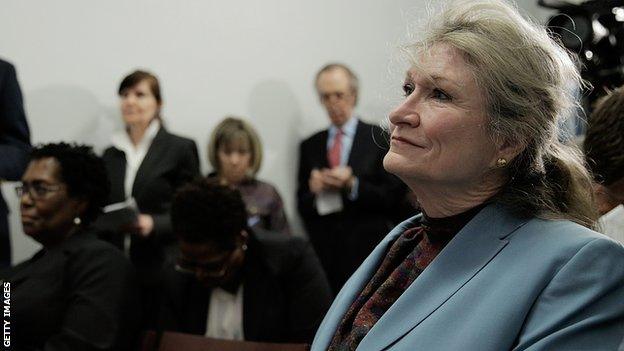
Alice Hoagland's son, Mark Bingham, died on board flight United 93 during the 9/11 attacks
Alice Hoagland never forgot the last time she spoke to her son Mark Bingham. It was 11 September, 2001 - and he was calling from a hijacked plane.
"He said he was on United Flight 93, and that there were three guys who had taken over the aircraft," she told the BBC on the day after the attacks.
"I asked him who these people were, but he seemed distracted and didn't hear the question, then he came back on and said 'it's true'.
"I told him I loved him, and then it went dead."
United 93 crashed into a field in Pennsylvania, killing all on board.
When the 9/11 Commission Report was published in 2004, it told how phone calls to and from the plane, as well as recorded conversations from inside the cockpit, showed a group of passengers had rushed the door. They were on the verge of taking control back from the hijackers when the plane went down.
Mark Bingham was one of the passengers who led the revolt. He was hailed as a hero.
He was also the inspiration for the Bingham Cup - which has become the world's largest amateur rugby tournament.
The origins of the Bingham Cup
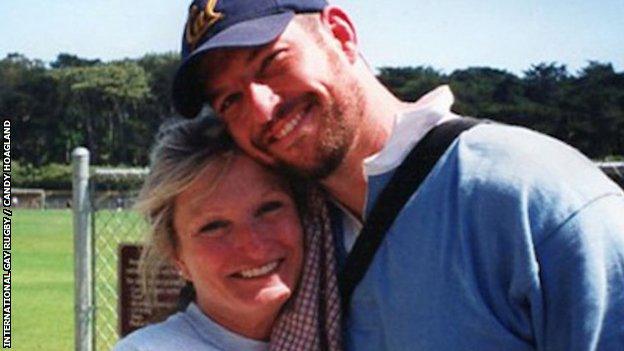
Alice Hoagland was integral to the growth of the event named in honour of her son
In the days following 9/11, the world learned more about Bingham - and his passion for making rugby a sport where everyone felt welcome.
He was born in Florida, before he and his mother Hoagland moved to California.
They didn't have much. Speaking to World Rugby in 2019, Hoagland described them as "poorer than church mice", and that they survived, in part, thanks to the fish her son caught - but they were remarkably close.
It was at high school in California that Bingham discovered the sport that would change his life.
"I was fairly apprehensive," Hoagland admitted, "because I had a very scary idea of what rugby was all about."
But it didn't matter - her son was hooked.
He ended up captaining his school team, and continued playing at the University of California, Berkeley, which is where he came out to his mother.
After graduating from university, Bingham signed up to play for the San Francisco Fog inclusive team.
He began discussing plans to form an inclusive club in New York - where he had opened a satellite office for his public relations company. He was committed to making the sport welcoming to everyone.
"We have the chance to be role models for other gay folks who want to play, but never felt good or strong enough," he wrote in one email.
"More importantly, we have the chance to show other teams we're as good as they are. Good rugby players. Good partiers. Good sports. Good men."
Bingham never lived to see that team - the Gotham Knights - come into existence.
But in June 2002, a group of inclusive clubs came together in San Francisco to hold a memorial tournament in his honour.
Hoagland was there to present the winners with a trophy - and the Bingham Cup was born.
The 'matriarch' of the gay rugby movement
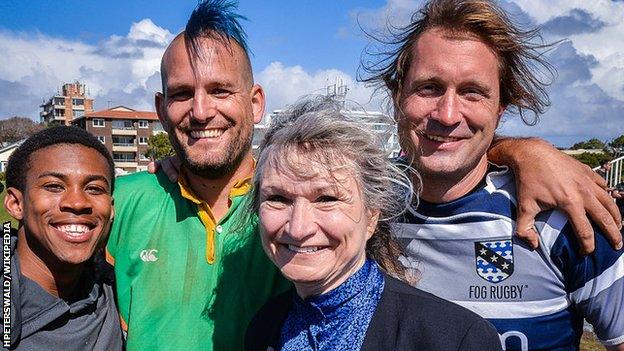
Alice Hoagland saw the tournament held in the USA, the UK, the Netherlands and Australia
It's hard to underestimate the importance of Hoagland's role in the growth of the Bingham Cup, or how devastating her death in December 2020 was to the gay rugby community.
She'd been part of every tournament since its inception, watching the biennial event grow from humble beginnings into a competition that attracted thousands of people from around the world.
She'd seen the event go to three different continents, and was held in such high esteem that one of the prizes at the tournament was named in her honour.
Ben Owen, a former president of International Gay Rugby, told the BBC in 2018 why Hoagland was such an integral part of the event.
"She's just blown over by the amount of love and support she feels, and how important that is to keeping Mark's memory alive," he said.
"For her, what's most important is that we bring the LGBTQ+ community into rugby, because she knows how important that was to Mark and how much inclusive clubs meant to him."
For many players, Alice Hoagland wasn't just Mark Bingham's mum.
She had, over successive tournaments, become what one player called "a strong, kind and loving mother to us all - and the matriarch of the gay rugby movement".
The future
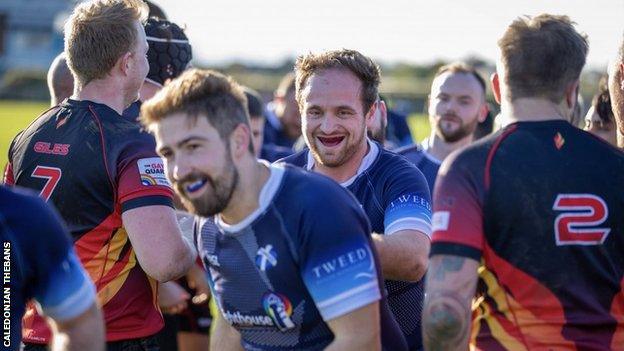
The Caledonian Thebans formed as a gay and inclusive rugby union team in 2002
The growth of the Bingham Cup hasn't changed the fundamental values that Hoagland and others instilled at its heart - inclusion, equality and sportsmanship.
But the Covid-19 pandemic did force organisers to change course last year, postponing the 2020 tournament in Ottawa and rescheduling it for 2022.
After that - who knows?
Hosting the Bingham Cup can bring significant economic benefits to a city, and prestige to the clubs where games are staged.
And as the event continues to grow, more mainstream governing bodies are throwing their support behind the bidding process.
The event has been held in London (2004), Dublin (2008) and Manchester (2012) and Luke Fenton, chairman of the Caledonian Thebans inclusive rugby club, is hoping to bring it to Scotland.
"Edinburgh is a rugby city - we have Murrayfield here, and we're working with the Scottish RFU, which is one of our biggest advocates," he said.
"We've got the city, the spaces, the pitches, the culture, and we've got the enthusiasm to host something that would be absolutely amazing."
A first safe space in sport
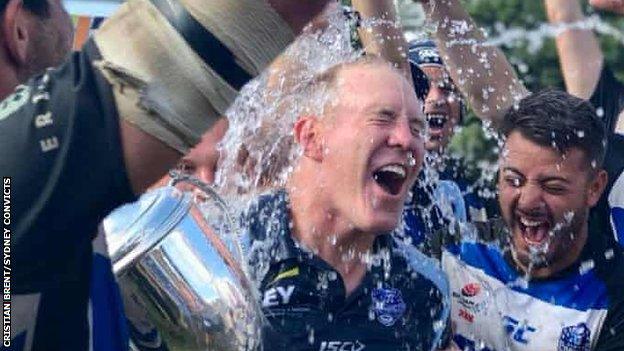
Sydney Convicts won the Bingham Cup in Amsterdam in 2018
For some players, the Bingham Cup has done the impossible - and provided a space where they, as members of the LGBTQ+ community, felt welcome in sport for the first time.
Tom Crotty, a member of the Sydney Convicts team that won the Bingham Cup in Amsterdam in 2018, said: "We were all in the shed before that final game, and our coach asked us to take a moment to reflect on why we were there playing rugby.
"And one by one, we went round and talked about our personal experience, including some of the boys who were straight about why they'd personally decided to fight side by side with us, and that was really overwhelming and a massive motivating force.
"The values and legacy of the Bingham Cup are interwoven into the fabric of our club - but I don't think it's until you go to your first one that you really understand it.
"It's an amazing feeling to go to an international event and be bound to these people from all across the globe, not only by your love for the sport, but also by who you are."
It's a fitting tribute to Mark Bingham, Alice Hoagland, and the values they held so dear.